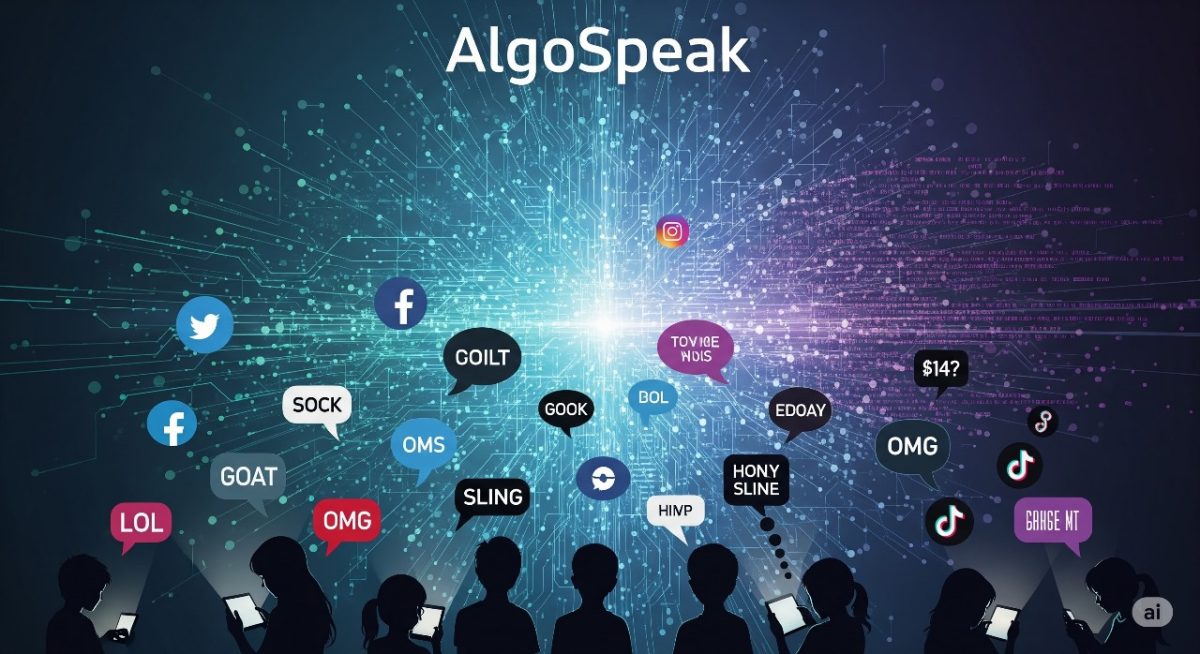Written by Jermaine Magethe
Every generation rewrites language in its own image. From the jazz age slang to Gen Z’s “no cap,” language has forever been influenced by culture. Something new, however, is happening.A new kind of language ‘AlgoSpeak’ is being formed. It’s slang that’s not just produced by youth culture but also co-created with algorithms and spread by social media influencers.
One of the most fascinating examples? The word “rizz.” Short for charisma, charm, or game in romantic interactions, it exploded into Gen Z’s vocabulary after being created by Kai Cenat, a popular Twitch streamer. Within days, it wasn’t just a word; it was the word. But Cenat didn’t work in isolation.
The algorithm helped him.
Creators substituting certain words with other words and phrases. For example, instead of gun, creators said boom boom stick. Instead of sperm, creators are using swimmers. Instead of kill or dead, creators used unalive or unalived as replacements.
Creators Are Today’s Linguists
As opposed to the past, when authors, artists, or subcultures incrementally made words mainstream over the span of years, creatives on TikTok, Twitch, YouTube, and Instagram nowadays can essentially make up a word on the spot, and watch it circulate globally in the span of hours.
Kai Cenat uttered “rizz” during a stream, and his millions of followers grabbed onto it. The algorithm recognized that content with “rizz” performed well. It pushed “rizz” videos onto more For You Pages.Other creators soon followed to ride the wave.
Children who watched these creators learned and emulated the word both online and off.
It’s a feedback loop: creators coin the word → the algorithm amplifies it → the audience uses it → more creators follow → the word becomes the norm.
This is what some researchers have called the engagement treadmill—where language is no longer dictated simply by social or emotional need, but by platform incentives. Words are meant for visibility.
The Impact on Children
For children and teenagers, language is how they learn about the world. Now, that learning is ever more dictated by:
- Influencer-Led Vocabulary
Children aren’t only learning new words , they’re learning from creators more influential than parents, teachers, or books. This shapes:
> Their definition of confidence, beauty, popularity, or humor.
> The kind of identity they act out online and offline.
> What kinds of words are “cool” or “cringe.”
- Rapid Language Cycles
Slang like “delulu” (delusional optimism) or “brain rot” (addictive, low-quality content) cycles in and out overnight. The result:
> Children repeat words without fully understanding their meanings.
> Language becomes trend-based instead of meaning-based.
> Conversations start sounding more like meme patterns than real dialogue.
- Algorithmic Visibility-Driven Speech
Because platforms censor the use of specific words (e.g., “kill” or “suicide”), children learn to say “unalive” instead not to spare themselves emotionally, but to avoid having their content flagged or taken down.
This teaches them early that some words are bad not because of meaning, but because of moderation. It’s machine-powered self-censorship.
- Global Virality, Local Disconnection
A 10-year-old in Nairobi, Manila, or Manchester might all be saying “rizz” today. But they may not know:
> Where the word came from (AAVE and Black internet culture).
> What larger histories or communities it refers to.
> How global trends are replacing local expressions.
5. Sexual abusers using code words to bypass content filters
Sexual abusers can now use secrets including code words for body parts to hide their abuse. Words such as penis and nipples are correct medical terms. Inventing cutesy code words to bypass content filters is leading to a slippery slope.
When the Algorithm Speaks First
It’s simple to see this as harmless play. Yet language isn’t simply words; it’s how we:
- Learn empathy and nuance.
- Express complex emotions.
- Make sense of power, identity, and belonging.
When children grow up speaking for the algorithm, their voice becomes performance, their words become strategy, and their learning is based on engagement, not on truth.
And since creators get paid for trendsetting however unintentionally there is little incentive to stop and reflect on what their words actually mean to young people.
What Can Parents, Educators & Child Advocates Do?
We don’t need to stop children from speaking online. But we do need to help them manage how that language gets shaped and who shapes it.
- Decode trends. Ask children what they think new words mean. Follow their origins together. Allow them to teach you, and use that as a gateway to teach them.
- Talk about digital influence. Describe how influencers like Kai Cenat or others dictate trends and how algorithms give some voices more volume than others.
- Build media and language literacy. Teach kids to think critically about why certain words are popular and how language can influence feelings, culture, and understanding.
- Value local language and expression. Encourage children to mix internet slang with their mother tongue, home culture, or traditional expressions. Language is not just about fitting in; it’s also about belonging to somewhere real.
We’re All Speaking Algo speak Now
The internet has always given rise to new dialects but now the dialect is being driven by something new: platform design.
Children aren’t just imitating influencers. They’re picking up the language of algorithm-friendly speech; a digital accent that prizes engagement over depth, trendiness over context.
If we want to make children into thoughtful communicators and analytical thinkers, then we need to do more than teach them “proper” English or Kiswahili. We need to teach them to ask who benefits from the language they speak, and why.
Because in a world in which producers control the lexicon and algorithms choose the winners, language is no longer simply spoken; it’s optimized.

